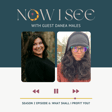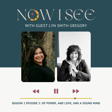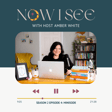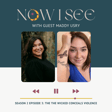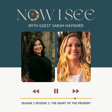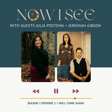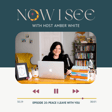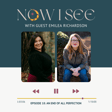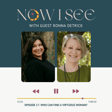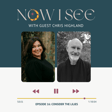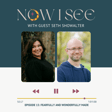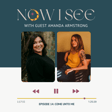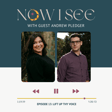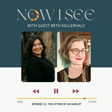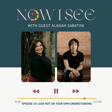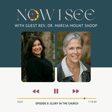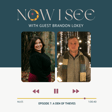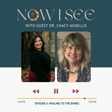Become a Creator today!Start creating today - Share your story with the world!
Start for free
00:00:00
00:00:01

Ye Careless Daughters: Family Dynamics through a Catholic Deconstruction with Sarah A.
Being at odds with a family still deeply entrenched in the faith you’re questioning is often the most challenging part of deconstruction. More often than not, it disrupts the relationship and causes a rift that feels like a masterclass in boundary setting.
In this episode, I’m talking with Sarah A. about her journey through deconstructing her deeply Catholic upbringing. Together, we discuss the ups and downs of being a former faithful child of people who desperately want you to have their faith.
Resources
- Read How We Heal by Alex Elle
- Read Adult Children of Emotionally Immature Parents by Lindsay C. Gibson
Links
Transcript
Introduction to 'Now I See' Podcast
00:00:01
Speaker
I was lost in utter darkness I was trapped in toxic shame I was bound by my religion Till I chose to break away
00:00:24
Speaker
Now I'm finding my true colors For the first time I feel free Now I'm learning self compassion And as I heal I'm finding peace
00:00:51
Speaker
Welcome to Now I See, eye-opening stories from the formerly faithful.
Challenges of Leaving Faith Systems
00:00:56
Speaker
I'm your host, Amber White, and here, me and my guests share our experiences in loving and leaving rigid faith systems. Together, we shine a light on the dark corners of these institutions and share the joys of rebuilding life on our own terms. I promise you'll leave inspired, even if you are a little teary-eyed.
00:01:23
Speaker
Hello, and welcome back to Now I See. I'm your host, Amber White, and today I'm bringing you our first anonymous guest. For many folks, it can take years to feel comfortable putting themselves out there after leaving their faith. It took me 13 years to do this podcast, for example. And for many of us, speaking out publicly just isn't part of our journey, and that's okay.
00:01:52
Speaker
I won't be bringing you anonymous episodes very often. There's only one this season, but they may happen on occasion because this podcast is, most importantly, a space for people to share in a place of safety. I'm excited about this episode because we're going to hear from someone who was part of a very different type of Christianity than we've discussed so far. Catholicism.
00:02:18
Speaker
There is a long and violent history between Protestant and Catholic Faithfuls, and as you'll hear in the episode, Sarah and I both heard the evils of the other side in our childhoods. It's amazing how the need to be right can divide people claiming to serve the same God, isn't it? As if God could possibly care about the way you're baptized, or if you kneel the right way, or say the same man-written prayer the right way?
00:02:46
Speaker
But for all the flavors of Christianity we'll hear about this season, something none of us former faithfuls get to escape is family tension. I have listeners that are brand new to leaving and still keeping their lack of church attendance a secret. And grown women in their 40s and 50s still navigating it decades after leaving their childhood churches.
00:03:10
Speaker
It's one of the hardest parts of the journey, and after 13 years, I can't say it's gotten any easier.
Family Dynamics Post-Faith
00:03:18
Speaker
I've just gotten better at it and stronger in my sense of self. But I remember the early years like they were yesterday.
00:03:26
Speaker
I was so nervous that the topic of faith would come up and I'd have to deal with the emotional outpouring or suppress my actual thoughts or, worst case, have to explain myself to people who had little respect for me with the fact that I didn't want to talk about it. I avoided it like the plague. For most of us, family life after leaving the family faith is never the same.
00:03:55
Speaker
there is always an underlying tension, even if it's just in ourselves, because we know that given the opportunity, the family will do their damnedest to try to get you into a conversation for the sole purpose of trying to prove to you that you're wrong.
00:04:12
Speaker
And it comes complete with a lot of guilting and shaming and emotional appeals. If you're thinking that we should just be rational and come to a mature agreement, I hate to be the bearer of bad news, but that doesn't exist in the extremist world.
00:04:29
Speaker
In the eyes of the most deeply devoted, there is no compromise, no agreement, no settling. You're either in it their way or you're out, which to be fair is a lot of pressure on a parent if they're truly worried about their child's eternal soul and a lot of loss of control for the more narcissistic parents who need it to feel safe and project the right image of their lives to make them look good.
00:04:59
Speaker
In short, it's complicated, it's multifaceted, it's messy.
Living Authentically and Personal Regrets
00:05:05
Speaker
But if there's one thing I want anyone out there struggling with family tension post-faithfulness to know, it's that this is your life and you have to live it for yourself. My biggest regrets are when I made choices to please other people
00:05:21
Speaker
or get their affection or their praise or even just their attention. You will be your best, your happiest, and your wisest when you're listening to and deeply respecting yourself. And you don't have to explain yourself to anyone. You're allowed to not be a believer for any reason
00:05:45
Speaker
or no reason at all. You don't have to spend your time crafting just the right arguments and defenses. You don't have to provide endless, well-researched proof unless you just want to.
00:06:00
Speaker
it will more than likely fall on deaf ears anyway. I promise your time is best spent getting to know who you are, what you like, and what actually matters to you. Sarah, our guest today, is doing just
Catholic Upbringing and Familial Expectations
00:06:17
Speaker
that. And I'm so glad you're going to get to hear just how much fun she's having exploring her inner world.
00:06:25
Speaker
As a warning, there is a brief moment in this episode that contains mention of physical abuse. Okay, now that I've said my piece, let's get into the episode.
00:06:46
Speaker
Hi, Sarah. Welcome to the podcast. I am so excited to have you here today. Really looking forward to talking to you about this topic because, you know, growing up Baptist, my understanding of Catholicism is limited at best.
00:07:04
Speaker
think my first introduction to Catholicism was being told how wrong it is. Yeah. And those little gospel chick tracks that lay out in conservative like evangelical churches that were all about like how to witness to a Catholic and it involves anything the hell and like just a wild ride. So I'm really excited to have you here to one dispel some of those myths, right?
00:07:31
Speaker
Get some of those myths out of the way, but also to learn and to hear more about your story and your experience. So again, thank you for being here. I'm really excited to have you.
00:07:41
Speaker
Yeah, Amber, thank you so much. I am also really excited to be here. As a young Catholic, I think that, you know, that street goes both ways, right? We had, I had some very funny experiences being taught about the Protestant kids that you might, you might meet in class, right? So I think, yeah, we're here today to break down walls, you know, we're not, I'm not, Catholics aren't the Antichrist and neither are the Baptists. Maybe they both are, maybe that's the problem.
00:08:08
Speaker
You know what? You might have a point there. We might be on to something. Yeah. So as I do with every guest, I would really love for you to kind of give me a lay of the land of what it was like growing up for you, what your family was like, and kind of what your experience of Catholicism was throughout your childhood up to high school and all that.
00:08:31
Speaker
So I was born and raised into a Catholic family. My father was also born Catholic, so we call that a cradle Catholic, right? Not a convert. But my mother did convert to Catholicism when she married my father. She was originally Lutheran. And so people always say,
00:08:51
Speaker
converts sometimes are a little more zealous than those of us who were born into the faith. And I think that there's some truth to that. But I grew up going to this Catholic church, a small town in North Carolina, and it was the only Catholic church in the county, so it was pretty large. And we had a very large Latinx population as well, but that stayed honestly pretty separate.
00:09:15
Speaker
I think like the English speaking and the Spanish speaking church stayed pretty separate. And then I went to Catholic school all the way from kindergarten to eighth grade and then went to a public performing arts high school.
00:09:27
Speaker
And that's kind of when I started to maybe pull back a little bit from the church, which makes sense, right? I was no longer in it every single day. And I was meeting people outside the community at that time. That's pretty much it. So I'm curious if they're, like you're talking about convert versus cradle Catholic. Is there a hierarchy? That is an interesting question. I don't know necessarily that anyone has a higher status based upon
00:09:56
Speaker
how they came into the faith. However, sometimes I do think there's like a little bit of a competition to prove how devout you are. Whether it's said or not, I think that people who have converted to Catholicism feel like they have something to prove, right? That they are validating their choice to have this life change.
00:10:19
Speaker
That's interesting. Are there any ways that you can point or anything you can look back on with your mom that you can see like her trying to prove herself?
00:10:30
Speaker
Yeah, I mean, both of my parents are super, super involved in their church, still are, they were. But it was interesting, I remember as a kid, my mom's family is still all Lutheran, pretty active in the church. I mean, she has a cousin who's a Lutheran pastor, you know, so it wasn't like she came from a
00:10:49
Speaker
like lukewarm family about a religious that they were very very involved in their in their faith so that was always an interesting thing for me to to witness right because you'd think like oh she left the Lutheran church because she just feel like you know she wasn't super attached to it and she's like well my husband's Catholic and that you know that'll just make sense for me but I remember as a kid like
00:11:11
Speaker
listening to her kind of argue with her parents about their beliefs, and that was always really strange, right? Because she had a lot of respect for her parents, and I think that that family structure is very important to her, but she had no qualms with kind of telling them that she thought they were wrong, which was crazy to me because she would never do that in any other aspect of her life, right?
00:11:34
Speaker
something that she believed that they had more knowledge over. She would never have corrected my grandmother about a recipe in the kitchen, but she was pretty quick to say, you know, mom, I think you just need to think a little more critically about your beliefs and how much fuller the Catholic Church is. She's like, you're not getting the full experience.
00:11:52
Speaker
full experience. That's interesting. Wow. Oh, that mother daughter dynamic within families is fascinating to me. And I think there's generational gaps are huge anyway, but now you're looking at different religious beliefs. It's interesting to me that your mom and grandma had that and you and your mom kind of have that too.
Parent-Child Relationship Struggles in Faith Context
00:12:16
Speaker
That is interesting. I think back even to my own mom, she and my grandmother do share a lot of beliefs, or did, but she and my grandmother did have very different beliefs.
00:12:29
Speaker
And there was no one in the world that my mom respected more than my grandmother. And I'd say that's still true, that there's no one my mom loved more than our grandma Sadie. But they would definitely still dispute over politics and religion. And I just think that is the most fascinating thing in the world. Because my mom would drop everything to go take care of her, but they were going to butt heads over seeing.
00:12:54
Speaker
having this different belief system. I just think it's interesting how that escapes none of us. If we don't stay in the same religion, there's going to be this divide. It's devastating, I think. I agree. My grandparents never really spoke to me much about their experience watching their daughter essentially denounce
00:13:17
Speaker
her entire life and belief system, everything that they have taught her. Because I was young, my grandmother died when I was in middle school, and I don't want to ask my grandmother about that necessarily, he's 90 now. But I have heard some things from other family members now that are telling me things that my grandparents had said to the family, well,
00:13:41
Speaker
they need to be careful with what they're teaching those kids cuz if they force it on them there they're just gonna leave you know that my grandparents would say that about about my parents never never to me but something that i've heard recently and i'm like oh that's interesting.
00:13:56
Speaker
And it's so true. It is true. The more it's pushed, the more it's like, please stop pushing. And that's a tough dynamic. For me, when I was first walking away from fundamentalism, and I had to make that break with my parents, because we were all in it together. We were very enmeshed and tight-knit. And so for me to break away, it was kind of a big deal.
00:14:22
Speaker
that initial break, you really have to create some space because their whole goal is to get you back into it and to show you how you're wrong. And because they're scared for you or they're scared of this change or they're scared of what might happen and their parents, that's what they do. They worry about us and they want to make sure that we're going to be okay. And when your eternal soul is on the line, you know, the pressure is on to, I think,
00:14:47
Speaker
really get you back into it. And it's interesting to me how that supersedes, or maybe not supersedes, that is more important than the relationship. Wow, that's really, that is really well said. And it's something I've been thinking about a lot, actually, recently. It's something that I didn't really understand until recently, how truly scared
00:15:13
Speaker
that they are. How genuine that is for them. I left or started cutting ties with the church when I was in high school. I'm a young adult. I'm 18.
00:15:25
Speaker
I don't know, you hear anything your parents say, you just sort of roll your eyes at that point. They would always say like, you know, Sarah, we feel like we're failing, we're failing as parents, we're failing as Catholics. And when I was a teenager, I was like, oh, they're just being dramatic, like they just don't, they just want to control me, whatever. And I think as an adult, now I really see like, well, now I see, yeah, that it really is coming from a place, like they are genuinely afraid and they feel like they have failed.
00:15:54
Speaker
as parents and as Catholics raising young Catholics. That is heartbreaking to think about. I think my parents are wonderful parents. They're not perfect. Everybody makes mistakes and I don't necessarily agree with all the practices that used to raise me, but I don't think that they have failed as parents by any means, not yet at least. I'm only 25.
00:16:19
Speaker
We'll see. I have plenty of time to flop, but it kind of breaks my heart sometimes to think about that. However, it still doesn't change the fact that I am not a part of that community anymore. And it does affect your relationship. They put that obligation to ensure your eternal soul before the relationship of parent and child. It's something that
00:16:44
Speaker
My brother is kind of struggling with a lot right now. I think we might have talked about this before, but he's about to get engaged. He's not Catholic anymore. His bride-to-be is not Catholic, was never Catholic. They don't want to get married in the Catholic Church. My parents are taking some real issue with that. I'm really, really worried that this argument is going to spiral into
00:17:08
Speaker
a large divide in the family. So I'm interested to see how that plays out. That's devastating. That's a huge time in somebody's life. Getting married is a huge decision, a huge decision. And to not have your parents' support due to the location,
00:17:26
Speaker
Oh, that's brutal. That's hard. It's so brutal. It's not they, I mean, they love her, my brother's partner. Yeah, they adore her. They think she's excellent. They love my brother, obviously. But I mean, they have frequently RSVP'd know to like weddings of children and their, of their friends, because these kids didn't want to get married in a Catholic church. And they have told them, and they've like burned some bridges with some like very long time
00:17:52
Speaker
Family friends because of that which is just crazy to me I'm like I get that you feel like it's your obligation as a Catholic to like speak your truth to some extent But like what some way it's just none of your business I think what people who didn't grow up like we did right like deeply entrenched in a religion Don't understand is that when you make that break and you decide to live differently It is a master class in boundary setting
00:18:23
Speaker
with the people, right? With the people who for most of your life did not have boundaries with you because they needed to change your diaper and make sure you didn't die. You know what I mean? So I think there's a double whammy of normal parent.
00:18:42
Speaker
tension there, where it's like, hey, I need to establish myself as an individual. And that's a really important part of development. But I think you throw in this religion piece and all of a sudden, it's an emotional whirlwind. And there's this extra thick, hard to cut through layer. And it just makes the process so much harder, I think. Because it's not just, hey, I want to take this class, not that one, stop telling me what to do. It's, I don't know if I believe in God or not.
00:19:13
Speaker
And I'd really like to respect my privacy around the matter and let me come to my own conclusions about what is true and what is not true. Yeah. And that's the craziest part to me, I think. I mean, we talk about mother-daughter relationships, right? That is so difficult for me to understand about my mom is that she did make a choice. She decided to do this. And you think that would make her the most understanding person in the world about somebody who's struggling
00:19:41
Speaker
with their faith. And I think to some extent she tries to understand, but she feels like she has made the penultimate decision like this, like she's correct. And like, well, now that I've figured it out, why would anybody else want to do anything different? And so I'm like, there's that she gets over that wall. And it's like, I don't, it does not compute it. I don't, I don't understand. And she doesn't understand me because she's made a decision
00:20:04
Speaker
to be Catholic and I have made a decision not
Balancing Personal Exploration with Family Relations
00:20:06
Speaker
to be. And she doesn't understand that. She only understands the decision to become a Catholic. But I'm like, well, you decided not to be Lutheran anymore. But yeah, she doesn't understand the going back as she sees it. She sees it as regressing. That's a tough thing. There is no closing that gap, right? There is only managing the relationship at that point.
00:20:31
Speaker
You know, when you are exploring, right? Like you're exploring like what is out there? What could be true? How do I want to live my life? Do I want to be associated with any institution, much less this one? And they've decided and they are set on that decision.
00:20:50
Speaker
You can't bridge that gap. You can't drag them over to the open-minded let's explore side with you. You can only live your life and hope that they understand and continue to love you. And you can only let them continue to do the same.
00:21:05
Speaker
And I think that's such a sad, that's something I've mourned a lot over the years. There's just no way to force that same amount of closeness, because you're always going to have this little bit of a divide. You're always going to be going, please step back a few steps from me in this issue. And they're always going to be trying to drag you closer. And it just creates an underlying tension.
00:21:30
Speaker
that for all the love in the world, we'll still be there? Yeah. Yeah. It's hard and I warned that. I think, and I'd love to hear your perspective on this as well. I think when as a young person, the both of us decided to leave the religious communities we were in, your priorities shift in a big way, right? Huge. When you are in
00:21:50
Speaker
a Christian community, you are taught that it's God first and everything else second. So God, family, and then everything else. And when you leave the church, God is no longer your top priority, but the people you love, God still is. And so I think that might be the biggest divide between me and my parents is that for them, they are Catholic first. They are, quote, children of God before anything else, before even they're my parents. They are.
00:22:19
Speaker
Catholics and I just don't see like I that's something that like I just can't even begin to understand anymore not that I ever really did understand because when I was a Catholic as a child right like how much of my understanding how deep was that I don't know
00:22:36
Speaker
Yeah, I think about that too, because I was a studious kid.
Questioning Religious Teachings and Personal Identity
00:22:40
Speaker
I don't know what your experience was like, but my understanding of Catholic schools is they're very big on education, right? So you're doing a lot of educating yourself, but also learning in school. I was a studious kid, and so I'm reading the scriptures over and over and over again, and I'm just not coming to the same conclusions.
00:22:58
Speaker
I'm just not, right? And I'm seeing people say one thing and then do another. I just can't overlook it at a certain point. And I think looking back, I wanted to be in it so bad because I'm such a horrible people pleaser.
00:23:14
Speaker
It's a huge problem of mine that I've had to work on a lot over the years and it has put me in a lot of terrible situations, but I really wanted it. And so I tried really hard. And so I look back and I'm like, what part of me truly believed this and what part of me or how much of me truly believe this I should say, and how much of me
00:23:34
Speaker
just really wanted to for the sake of making everyone around me happy and at peace. And that's an interesting thing for me to think about sometimes. Yeah, that is really interesting because I think that a lot of our religious beliefs as children, yeah, it's just rooted in our base personality tendencies. Does that make sense? Right? Yeah. My parents like to say I was a rather precocious child.
00:24:01
Speaker
I don't know. I think a lot of it just came from wanting to belong. I went to a Catholic school and so all of my peers were being taught the same things that I was and to be argumentative and to be contrarian would be to set yourself apart. When you're 12 and in middle school and it's the worst time of your life, that's the last thing you want to be is different.
00:24:27
Speaker
So you're not, right? Like I wear the same khaki skirt as everybody else. So I'll say the same prayers as everybody else.
00:24:34
Speaker
I think, too, the stakes are so much higher when you're younger. When you're an adult and you decide to walk away, there's only so many consequences you can face. And most of them are of your own choosing. When you're a kid, your entire world is wrapped up in this. And being contrarian with your entire church, your entire school, and your family is dangerous. Yeah, absolutely. And I think that that's the case for any child.
00:25:02
Speaker
You live in the community that your parents have set up for you because you have to like, I have to be where my parents say I have to be because I'm five, you know, I'm a kid. Like I can't be left alone. So I go, I go where they tell me. And so, you know, that's less of an issue, right? Because when you're a kid, you just see it as like, Oh, well, this is just where we hang out. This is what we do every Sunday.
00:25:25
Speaker
And I think that's when most people start to have doubts and schisms to speak about the Protestant Reformation, the great schism of your childhood, is when you're coming of age, right? You're trying to assert your own independence and individuality, and you start to realize that, oh man, I am here not because necessarily I have to be anymore. I've got my driver's license now. I could just leave. But then you start to examine, well, why do I want to do that?
00:25:54
Speaker
Is it because I can or is it because I need to? Yeah. And that's a tough decision to get to. Like you start thinking it. And for me, it took years to even explore that further. It's a process. I found that going towards that schism, like letting it happen. I'm curious what some of the things were since you were kind of deeply entrenched in it. What were some of the things that came up for you that kind of sparked your decision that like, I don't, I don't think I want to be part of this anymore.
00:26:24
Speaker
Yeah, I think things started out sort of on a superficial level, right? Like when you're 16, you don't want to wake up at eight in the morning on a Sunday to go to church.
00:26:34
Speaker
Like I think I just at first was just like starting to find things annoying. But then I, in high school, I no longer was going to a Catholic school, I was going to a public school. And when you are that age, you're starting to come to terms with a lot of different parts of your identity. And I was starting to like really question and discern my own sexuality. And I was not out in high school, I didn't, I was not out until college, but I started to realize that like,
00:27:02
Speaker
Oh, maybe I'm a little different. All those things that they said about gay people and them going to hell, like, oh God, what if that's me? What if that happens to me? Am I evil? Is there something wrong with me? It really started to discern those things. When I was in high school, I met
00:27:25
Speaker
You know i had some queer friends i'm like oh no they're not the double wow look at them lovely people and started to see examples of how i could.
00:27:35
Speaker
be okay. I think that was a big deal for me. I think also when you're in high school, you start to form your own political beliefs. And I started getting, and especially in college, started getting more involved with activism and things like that. I don't know. I think it came from a lot of places, right? Like a self-identity crisis, right? Like I started to realize that
00:27:57
Speaker
Who i am in my true self can exist in the catholic church because i'm condemned just for being who i am and then beyond that. I'm seeing people that i love and care about being condemned for who they are and that's just really not something that i can understand and so i started to really examine.
00:28:17
Speaker
Why were we all feeling this way? And I started to realize that churches like the Catholic Church and the Christian Church and any of these major religions, it really does come from a place of control.
Conflict with Family Over Faith
00:28:27
Speaker
And so it brings me back to my original point of, well, I was 14 and I didn't want to get up at 8 o'clock in the morning on a Sunday.
00:28:35
Speaker
because i felt like i was being controlled it's like that's a really small very shallow thing but it's still rooted in the main problem right right that i i wanted to be who i was on my own terms and i you know i didn't really start to see that until i moved out you know went to college but starting to really realize that in high school
00:28:54
Speaker
Yeah. At what point did your mom or either of your parents really start to pick up on the fact that maybe you weren't in this? Was there a moment or was it gradual? I think it might be a little gradual because
00:29:11
Speaker
I mean, it was a big, big shift for me going from Catholic school to public school. And in the Catholic Church, when you're about in eighth grade, you go through confirmation. And this is like when you are confirmed, it's like a year long process. Like you have to take extra classes to do a project on your patron saint. You have to go to a bunch of retreats with other kids your age and like
00:29:33
Speaker
that you have this big mass where you're anointed and you essentially are saying like, I am now an adult in the church. I am recognized as an adult in the church when you're 14.
00:29:45
Speaker
But it's really the first time that, theoretically, I am choosing to be Catholic, right? Because up until this point, I was baptized as an infant, so I had no autonomy over that. And then the other sacraments, you receive your first confession and your first communion, you're under the age of 10. So not a lot of autonomy in that. It's when they dress you up like the child bride, like I was talking about before. Say your confirmation is really the first time when you're asked to say that you're a Catholic.
00:30:12
Speaker
So that happens in the spring of my eighth grade year. And then less than six months later, I'm no longer in the community every single day. So it was, it was interesting. Like you're given this, theoretically, this power to say like, I am choosing to be Catholic and immediately thrust into a larger community that is not so, I don't want to use the word oppressive, but controlling. And I think it's, at least that's when it started to happen for me. It was sort of a culture shock, right? I was like, I,
00:30:39
Speaker
Was essentially told you know this is when you when you're confirmed like you're choosing that you're choosing this but really it wasn't a choice because it was. Shove down my throat every single day every hour especially for the last year is my entire life every day after school almost every weekend we were doing something to prepare for your confirmation.
00:30:57
Speaker
And then it was no more right like the only really connection i had a church anymore was sundays. And so yeah that was really i think really jarring for me as a young adult and my parents really did they really wanted me to go to a catholic high school but the closest one was like forty five minutes away and i really wanted to do theater and there's performing arts high school in our towns i want to go there i did.
00:31:19
Speaker
I won that battle to some extent, but I think my parents started to notice that I wasn't fully invested anymore a couple years into being in high school. I started sleeping through my alarms on Sundays, not wanting to go to church and faking sick, stuff like that. And then I think this was maybe my sophomore or junior year of high school. There was this particular Sunday that was really a
00:31:46
Speaker
a shift. I just wasn't, I wouldn't get out of bed. I was refusing to go. I didn't want to go. I didn't want to do it. You can't make me. And I remember distinctly like my dad dragging me out of bed, throwing me on the floor, saying, you don't have a choice.
00:32:04
Speaker
You have to go. And I was like, I was then drug into the bathroom, told to take a shower. He stood outside the shower, waited. I was going to church. I mean, there were tears. They were screaming. And that happened, and then they didn't force me to go anymore after that. I imagine that was traumatizing for the involved. Yeah, yeah. They still asked me to go every Sunday, and there still was argument.
00:32:33
Speaker
But that was the pinnacle of that. I don't know. It was really scary. I didn't really know what to think or what to do about it at the time. I was like, oh shit, I guess I'm going. Was that the most awkward car ride of your life?
00:32:49
Speaker
Oh my God. Yeah. I think I just like put in my headphones. It was like listening to what like death cap for cutie in the car or something like that. I was like, they don't get me, but really it was like, it was really scary. I like, I remember going to church that morning and didn't sit with my parents. You know, I sat in the back in the vestibule and I was, yeah, I don't know. And I, I've never talked to my, my dad about that that morning. It was, I don't know.
00:33:15
Speaker
It was really scary, because I don't see him get angry very often, but when he does, it's very big. And he was really angry that I was deciding not to go to church. Wow. That's a really emotional and terrifying moment. I'm really sorry that happened. And I'm sure he is too. Yeah. Abby White's never been brought up again.
00:33:39
Speaker
Yeah, no, totally. My dad is Irish Catholic, so people joke. Irish people hold all their emotions right in the middle of their chest, and then you die. That's it. You don't ever let it out. It's funny. I have so much Irish in my family, and yep, that sounds about right. That's pretty funny. Yeah.
00:33:59
Speaker
So he's, you know, very quiet, but he's like a funny guy. Like he and I have a very light relationship now, but I remember seeing him get mad a lot when I was a teenager with my brother and with me. But that's really the only emotion, like big emotion he would ever show would be like anger or frustration. Everything else is pretty even keel. Huh. Well, the way we socialize men, I'm sure has a lot to do with that.
00:34:27
Speaker
But I'm also curious, do you remember how the Catholic Church or the Catholic Church that you grew up in, how they talked about anger? It's a sin, right? It's wrath is one of the seven deadly sins. And the Catholic Church talks about emotion, I think,
00:34:44
Speaker
in terms of extremes being sinful. Anything in extremity, anything in excess is a sin. So yeah, I think getting really, really angry, not good. Interesting. I was just curious. I think sometimes in the church I grew up in at least,
00:35:03
Speaker
Anger was bad and good.
Managing Anger and Emotional Processing
00:35:06
Speaker
It was interesting. It was a very much a roller coaster relationship with what anger was good and what anger was bad because righteous anger was this big holy thing, right?
00:35:16
Speaker
Right. Absolutely. I mean, we talk about the only, they say like the only time that Jesus ever got angry was in the temple, right? When he's turning over the tables and screaming and breaking things. And that, I never understood that. I was like, seems kind of out of character for that guy. You know, as an adult, now I'm realizing I'm like, yeah, outbursts of
00:35:40
Speaker
of anger is not healthy. It is much better to be just honest with your emotions in the moment rather than trying to maintain this image of a stoic rock that men are expected to be in the church and then exploding. What's interesting to me about the way anger was taught in the church and what it sounds like it was taught in your church as well
00:36:06
Speaker
When you're always suppressing your feelings, but I think especially your anger, which is like the fieriest of emotions, I think. When you're always suppressing it and you're never releasing it or you're never expressing it, you don't ever give yourself an opportunity to open that window of tolerance any wider.
00:36:28
Speaker
So you're just always trying to force it shut rather than learning how to open and release it in a way that's healthy and allows for a free flow of ideas like that air in and out, right? And I think it's kind of sad because I think it perpetuates a guilt and shame cycle where you explode in anger and then you feel really bad. So you repent and you're like, I'm never going to do it again. But then you continue to suppress all those feelings.
00:36:54
Speaker
What are you supposed to do that there is no getting better if you don't let yourself be angry? So I hold really, really fast to the statement that when you leave a religious experience or you leave a religious institution to go out on your own and create your own life, let yourself be angry for as long as you need to be angry.
00:37:16
Speaker
Yeah. Because if you don't just let yourself be angry, not only are you going to extend the painful time by tenfold, you're never going to learn how to manage that feeling and move on with your life. You're never going to learn how to let that anger exist without exploding. And you're never going to learn how to place it in context with the rest of the other feelings that come with it.
00:37:41
Speaker
And so I just encourage people, like I'm sure you're still going through this because I remember being 25. Oh my God, nine years ago, I feel so old.
00:37:50
Speaker
And just being so angry. And I didn't know how to manage it. I didn't know what to do with it. I can't go just scream at my parents. That's not going to be helpful. And so it just took a long time for me to work through some of that anger. And I remember getting really frustrated because stuff would come up and I would get like, at a certain point, you just can't hide the snippiness in your voice. At least I can't.
00:38:14
Speaker
And I remember I hated being compared to like, you need to stop being angry like so and so because that anger is going to, and I'm like, you're the problem.
00:38:24
Speaker
you're making me angry. If you would just let me be angry, I could move on. And I finally did. And I gotta tell you, it was great. And I've learned how to look past like I'm mad and into like, what is making me mad? What is it tied to? And like, can I get to the root of that? And it's a good practice. So I encourage you as you continue on your journey of self and of, you know, your belief system to just
00:38:53
Speaker
let yourself be pissed off sometimes. Because it is shitty that the church comes between you and your parents.
00:39:01
Speaker
You're right, yeah. That anger is something I definitely really struggle with. Because I still do have a relationship with my family, and it's hard to hold two things at once sometimes, right? It is. But yes, it angers me so much that I can't be fully honest with my parents about who I am and what I believe out of fear of losing them. Right. Because they are told that,
00:39:28
Speaker
anyone who believes the things that I believe is wrong and, you know, kind of damned, for lack of a better word. And I think the anger that comes up for me sometimes is like, yes, my parents made choices, and that's what that is. But at the same time,
00:39:46
Speaker
They were indoctrinated by an institution whether or not it's classified technically as a cult is operating like a cult.
Control and Shame in Religious Institutions
00:39:55
Speaker
And that comes up a lot throughout the podcast. Institutions that operate like cults. They are very controlling and they use fear and shame and guilt to control people and they've gotten really, really, really good at it.
00:40:09
Speaker
Yeah. And so I've learned to turn a lot of my anger towards that institution. And that's kind of where a lot of this podcast came from, right? It's like, I think enough like these institutions are doing a lot of damage. Maybe we talk about that. So
00:40:23
Speaker
I think it's interesting. I don't know that I've mentioned this yet, but I was a religious major in college at a secular school, so it wasn't. I had no intention of going into the seminary or anything. It was honestly, I think, simply out of morbid curiosity of what my other options were. But one of my favorite, favorite classes that I took was a new religious movements class, which is a nice way of saying cult. And it's really interesting. My professor was very adamant about being careful about that word. And he's saying, he's like, the only reason
00:40:53
Speaker
nobody calls the Catholic Church a cult is because in the public eye, it operates in the lines of society, right? But all of these things that we consider to be cults, like let's take Jonestown.
00:41:05
Speaker
for example, started at its core, not on the fringes. They wanted to exist to help pressed populations have access to food and education. It was only when power shifted to exist on the fringe that it was considered to be a cult. Then the things that were in the public eye, things that were at the forefront of this movement were not necessarily condoned societally. That's when people started to take notice.
00:41:35
Speaker
the Catholic Church, for example, if everybody talked about how technically they believe in cannibalism to some extent, if you phrase it like that, if you phrase it that way, people are like, what? What? And you're like, no, no, it's just communion, right? But it's all about PR. It's all about the spin, right? So true. That's so true.
00:41:53
Speaker
some of these things we consider cults might just not have good marketing, quite frankly. Yeah, I think that's probably true. You can't look at Pat Robertson. I don't know if he was big in your life or if you know much about him, but you can't look at Pat Robertson who is regularly going against his own teachings and making exceptions for them and be like, hmm, maybe something is afoot. I don't know. Yes. Something is a mess here. I don't know. It's just I think a lot of things could be considered cults.
00:42:23
Speaker
Oh yeah. If you dig into them a little bit. Oh yeah. I would definitely put fundamentalism up there with that. Because for me, if you have to control people that much, maybe. Maybe. Maybe they don't want to be there. Yeah. I understand the need to have rules and laws and things to keep things moving in a certain way and to protect people. But when it comes down to, oh, you're listening to music with drums in your car,
00:42:52
Speaker
and therefore you are displeasing God, maybe that's a little bit too much control. Maybe that's a little bit unnecessary. What I think about a lot is that if you need, if an institution needs to use shame excessively, really at all, but excessively to keep people in line or to keep people coming or to keep people in the fold, if you will, maybe you're a cult.
Gender Roles and Societal Expectations
00:43:20
Speaker
Maybe you're a cult. I think shame is an incredibly powerful tool that is wielded by anyone who holds even an ounce of power. I think that that's what keeps people in line because shame comes from a place of fear and it's incredibly powerful.
00:43:40
Speaker
And it's really scary because I mean, that's something like I am no longer in the Catholic church, but I still deal with my Catholic guilt, my Catholic shame every single day. There's stuff that comes up for me and I'm like, what the hell was that? Where did that come from? And I'm like, that's something that I don't know that I'll ever fully dismantle for myself. Because I mean, from the get go, we were taught, I mean, the first book of the Bible to taught to be ashamed of your body.
00:44:07
Speaker
Right? That's, you know, that's in the first breath, baby. Like they found knowledge, they found realization and clarity, and then somehow that's shameful. I don't know. It sets the tone, you know, in a big way. You know what's interesting to me about that fear too is that it's so blinding that there are like blatant inconsistencies
00:44:31
Speaker
in the thought patterns and in between the thought patterns and the actions, but they just go completely unaddressed and unnoticed because to challenge that is to activate that fear. The fear is your eternal soul being tortured for eternity
00:44:50
Speaker
it doesn't get a lot worse than that. So there's a lot there. But I think about, I was thinking about this earlier today before we got on our call, you had mentioned a story or you had told me how your mom is the breadwinner of your family, right? She has this incredible job in a male dominated field, but she's still the primary homemaker.
00:45:13
Speaker
And that just blows my mind. Yeah, it's crazy. How are there that many hours in the day? I don't know. How does she think she has a time machine?
00:45:23
Speaker
I know, right? Well, what was interesting to me about is that she was kind of, I'm sure she tried to instill those values of womanhood in you, right? But you're looking at her and going, but you're a badass and you're in this very male dominated corporate field and you still come home and say that men are the top of the totem pole here, like from lack of a better term right now. That's interesting to me.
00:45:49
Speaker
Yeah, it's something that I still don't really understand. Like I said before, there's that wall of logic. She's on one side and I'm on the other, and I don't know that she can explain it to me all day, but I don't get it. She's the primary breadwinner. She works
00:46:08
Speaker
you know, five to nine. And she comes home and still cooks for my dad does the laundry, does the dishes, cleans the house. And my dad handles the financials. But like the crazy thing is, is it's not his money. I mean, some of it is but most of it isn't. That's so wild to me. The feminist in me could never
00:46:28
Speaker
I know, and she's kind of resentful of that also. She's been interviewed a couple of times for magazines about top 100 women in business in North Carolina. She did that a couple of years ago. I think it was a magazine in Charlotte that it ran. She was happy to do it because her company asked her to do it, but she was like,
00:46:50
Speaker
Sarah, she's like, I don't really get it. She's like, I don't really think about myself as a woman in business, like a feminist. She's like, just doing my job. And then like, mom, I was like, that's so crazy. I was like, that's so crazy to me that she's like, I don't think I need to capitalize on. She sees it as like a marketing ploy. Wow.
00:47:09
Speaker
interesting. She's like, I'm not a feminist. That's not who I am. So if I were your mom, I would also be resentful because I bet she's given up everything to be able to do both and to maintain that. I really like really don't know how she does it. Like I
00:47:26
Speaker
I could barely take care of myself as a full-time job and I'm like, oh, I got to make dinner for me. Looks like it's popcorn again. It's exhausting and I've asked her about that before and this is the part that's hard for me because she really does get so much joy from
00:47:47
Speaker
taking care of her family. And I don't think that there is anything wrong with that at all. For a long time, I was very short-sighted on that. I had a very small understanding of what it meant to be a feminist and what it meant to fulfill your role in life. And I want to start off by saying that what women do in the church and what women do for their family is incredibly powerful. These institutions could not function without women. Not for a week. Full stop.
00:48:14
Speaker
and what they're doing is so important. But they, I want them to understand that, that what they're doing is vital, but also that you have a choice, that you don't have to do that, that your value, my mom's value is not the fact that, I mean, like, yes, that she's my mother is incredibly valuable to me, but like, if she wasn't, right, like if for some reason she couldn't have children,
00:48:39
Speaker
that she's not anything less right that like you have another choice you have the option. To be valuable in any any way you desire right like you don't just have this one role. Right and you're valuable for the work that you do outside of your family and inside of your family.
00:48:57
Speaker
Yes. Yeah. It's all valuable. You're a whole person. And I just think, you know, I too have had that limited belief. Like I remember my early twenties kind of being like, no stay at home mom life. F that. No way. I'm going to be right. And now that I'm older,
00:49:15
Speaker
and I thought about it and I was a nanny for a long time too. It's a lot of work maintaining a home and raising children and making sure they're fed and that they don't die. It's a lot, much less trying to raise emotionally intelligent, healthy,
00:49:29
Speaker
you know, smart, like whatever, like it's a lot. And I, I think something that I hear on the feminist side of things a lot that is a problem is this like disdain for stay at home moms. And I think that narrative really needs to shift to what we were talking about here and what you said so wonderfully, which is like,
00:49:47
Speaker
All of these things are valuable. All of these things are incredible. Women do so much. They do everything, yeah. They do everything. And it is absolute insanity to me that they're so chronically overlooked for that. And it just makes me sad. And I think about all the ways my mom was overlooked for her accomplishments, but then how your mom is overlooking her own. And it's just kind of like, this is a wild ride. It doesn't make a lot of sense.
00:50:17
Speaker
Yeah it doesn't it doesn't make a lot of sense to me and it's also just sort of the default in most people's minds right like over the holidays. This is kind of funny but also like me examine your like no we were in a group chat with my dad side of the family and knuckles some of the older cousins and texting back and forth about we're gonna get together that.
00:50:36
Speaker
After Christmas and what's everybody gonna bring who needs to do what and everyone's responding and Which is funny like it's like my dad's got some great communic timing, but it's very true like when we have these family get-togethers like
00:50:51
Speaker
before hosting at the house, like he'll, you know, leaf blow the porch, right? And like, he'll take care of that. He'll get ice. But like, my mom is like up at the crack of dawn, like chopping and sauteing and baking and cleaning and setting the table and yeah.
00:51:08
Speaker
and creating a warm, hospitable environment for everyone to have a long time. It's unbelievable what I think women can hold, but I think as incredible as that is and as much as women deserve praise for that, I look at my mom and I wonder if you've had the same experience. I look at my mom and I'm like, how much of your self did you sacrifice to be everything to everybody?
Exploring New Spiritual Paths and Personal Growth
00:51:34
Speaker
You know, you've made this decision like I don't want to be part of the Catholic Church and you went to college, you graduated, you're working, you're independent now, you're living your life. I'm really curious like where your spiritual journey if you want to call it that, your belief system, your journey with your belief system, where that has gone and kind of where you're at now and what your thoughts are.
00:51:57
Speaker
I think as an adult, a new adult, I think we all struggle with this. I'm finding a sense of community. I think that's what I do miss most about being in the church, and I'm starting to realize it now rather than when I originally left, because when I originally left the church, I was still in school, so I had a built-in community.
00:52:20
Speaker
people with the same identity student and so it was a little less lonely in that way but then as an adult it's really hard to make friends and to find community when you don't have that built in structure and so for me in my spiritual practices i think the most important thing to me right now is finding a sense of community and then my spiritual life.
00:52:41
Speaker
is a little more personal a little more individual but i recently was like okay i gotta figure out like i was like i gotta join a club i gotta do something because it's like the only people i hang out with are people i work with and like that is not ideal all the time right
00:52:57
Speaker
So a friend of mine and I joined a pole dancing studio. I'd never done anything like that before, ever. It was really scary for me for a lot of reasons, but mostly because you're told your entire life that sexuality is one of the gravest of sins expressing your sexuality.
00:53:17
Speaker
Exactly exactly, but I have loved loved being a part of the studio It's been um over a little over a year now that I've been dancing and I loved for so many reasons right like I feel Super strong and super sexy and like I've never felt that before ever
00:53:34
Speaker
But also, I'm surrounded by these people once a week who are helping me feel that way, and I'm helping them feel that way. We're experiencing it together, and there is no shame around it at all. Everything's just out in the open, literally and figuratively. It's really, really cool to have this new little community to be a part of. And then spirituality
00:53:57
Speaker
for me right now in a more literal sense is like I really starting to get into individual practice with some pagan roots. Really love tarot. I've really been trying to like be more conscious of celestial events. So like being mindful on full moons and shifts in the seasons and things like that. A friend of mine for Christmas, I love to cook. A friend of mine for Christmas got me a kitchen grimoire.
00:54:25
Speaker
Yeah, I'm really excited to start cooking through it. So this, which she has like put together different recipes based seasonally, all seasonal ingredients, which is wonderful. I love to try to cook seasonally as much as I can, but also like for marking different celestial events. So there's a meal, like a feast for spring and summer and winter. There's a feast for all the zodiac signs for eclipses, all this stuff. And it, I don't know, that practice,
00:54:54
Speaker
I don't know. I really loved being very mindful about what I'm putting into my body. I've never really done that before. It's been a really cool experience and I'm learning and very new. I think I am still pretty bad at being diligent about ritual because for most of my life,
00:55:12
Speaker
Consistency and ritual is so important and I have a little bit of resentment towards that and I'm a little a little burnt out on it. So no, I don't catch every full moon. I'm not a straight A student when it comes to that, but I'm trying and it's been really interesting to shift from like your spiritual practice being your community like that being so intertwined and not really having a lot of privacy.
00:55:34
Speaker
when it comes to that, to now it being just me, really. And occasionally, I share that with others. If I try making one of these meals, I want other people to eat it. That's really important to me, but it's people I choose. I love that.
00:55:49
Speaker
And I love that you're getting to go on a solo journey while still finding other ways to create community. Cause I think it's important, especially in the early stages of like trying to leave and figure things out to establish your own belief system rooted in the things that you've seen in the world. And so I just love that you're getting to do that and that you're really taking the bull by the horn, so to speak.
00:56:14
Speaker
but also trying to create community through things that were once considered shameful. That's an incredible way to heal. I love that for you. Yeah, it's been really, really cool. Sometimes really hard, right? Like a lot of stuff comes up when you're so like behaving counterintuitively to like how you were
00:56:32
Speaker
your raise to be. And I hope that someday I'll get to a point where I can be honest with my family about that, but they have no idea that I am doing that. And that's okay for right now. It's yours. Yeah, it's yours. It's not everybody's. Yeah. And I think that's a great thing.
00:56:51
Speaker
So as we kind of come to a close here, as you know, I ask every guest the same two questions. I'm just super excited to hear your answers. So the first one is, what do you see clearly now that you didn't see when you were enveloped in Catholicism?
00:57:08
Speaker
Amber, I thought the question would be easier after we talked, but it's still really hard. That's okay. I think I see myself a little more clearly now. I think that for so long, a lot of the stronger aspects of myself and who I am and my identity
00:57:24
Speaker
was taught to be ashamed about and to hide and suppress. And I'm still actively working on being my full self, my full truth. I'm not out to everyone in my life about being a bisexual woman. My parents don't know that I like to pole dance several times a week, but, you know, they do know that I'm an ally. They do know
00:57:45
Speaker
that I'm pro-choice, they do know certain things about me that are innate and very important to who I am as a person that have nothing to do with the Catholic Church. And to just like removing all of the ties in my identity to the church has been really clarifying. And yeah, I think, yeah, if I was gonna say like what I see clearly now is me and who I can be outside of all of that.
00:58:12
Speaker
That is beautiful and I absolutely love that for you. Thank you. Thank you. That was so exciting. I am looking forward to seeing how you grow on this journey and I'm really excited to see what things you learn about yourself that you don't even know yet. It's really exciting. Me too. Am I allowed to ask you?
00:58:36
Speaker
that same question, I would love to hear your answer. Yes. So this question is being asked to me on my episode. Oh, good. But I'll answer it more than once because when I first came up with the question, I was like, oh my gosh, what is my answer? And I really had time to think about it. So for me, it is people over institution.
00:59:00
Speaker
I, for so many years, up until I was about 19 or 20 years old, put a belief system and a very specific church and a very specific way of thinking and a very rigid way of existing in the world above the human experience. That was the most important thing.
00:59:24
Speaker
And now, after many years away from it, I'm coming up on 13 years after leaving, I just see individuals so much better. And it is a much more beautiful way to live. It's a wonderful feeling to live in a world where you can make space for all kinds of people, where you can learn from other people's experiences without judging them.
00:59:53
Speaker
where you can actually make a difference because you're not just worried about whether or not it's being done in a specific way. Yeah. Yeah. And I've, I'm really grateful for that. I really love that. That is really, really cool. And I think that like what you're doing with this podcast is really living out your mission statement in that way. Thanks. That's really cool. I'm excited about it. And I'm excited you wanted to be here. So I have one more question for you because I want to end
01:00:19
Speaker
on a high note because our journeys aren't just the trauma parts, right? It's all about what we're doing, what we're becoming. And so I would really love to know what your greatest joy is in this journey so far, or maybe even a few moments of joy. It's up to you, but I'm wondering, you know, we all have things that we cling to that make it worth it for us. What are some of those things for you?
01:00:45
Speaker
I think moments of joy for me are seeing that I can be fulfilled, be a whole person without the church. You know, I think for so long, I was taught, my parents said this, like, if you don't, people who don't have the church are empty. They don't, they don't have a foundation. There's nothing rooting them to anything.
01:01:06
Speaker
That really scared me. A big part about why I was hesitant in leaving the church is I thought I was going to be freefalling through the universe, nothing tying me down. I found so much joy in being able to choose the things that ruin me and really customizing it. A whole grab bag of individual truths and building blocks for my life and getting to know
01:01:31
Speaker
What really is important to me as a person has been really, really cool. That is gorgeous. I love that. Well, Sarah, thank you again so much for being part of this podcast and for sharing your story. It was a pleasure to have you. I continue to be inspired by
01:01:51
Speaker
the way that you're embracing the journey and taking your time and exploring the world. And I just think you're a lovely person and I'm really glad that I got to meet you. Amber, thank you so much. And I'm so pleased to be a part of this as well. I think this podcast is so important for not only everyone listening, but your guests. I think that like I've learned so much about my spiritual journey just today, talking with you, lots of things coming up, which has been really, really cool. So thank you.
01:02:20
Speaker
The pleasure is mine, I assure you. It's a beautiful journey for me too. So thank you again.
01:02:36
Speaker
Thank you for tuning into this episode and being on this journey with me. You can find resources and links in the show notes. If you're enjoying the show, please subscribe, rate, and review, and follow along on social media to help us grow.
01:02:51
Speaker
Now I See is independently funded by me. If you'd like to help support the show, you can donate directly or purchase a merch item on the website. Music for this episode was made by Alana Sabatini, a former faithful and talented musician. And finally, this podcast is made possible by the incredible team at Softer Sounds, a feminist podcast studio for entrepreneurs and creatives providing technical skill with tender support.
